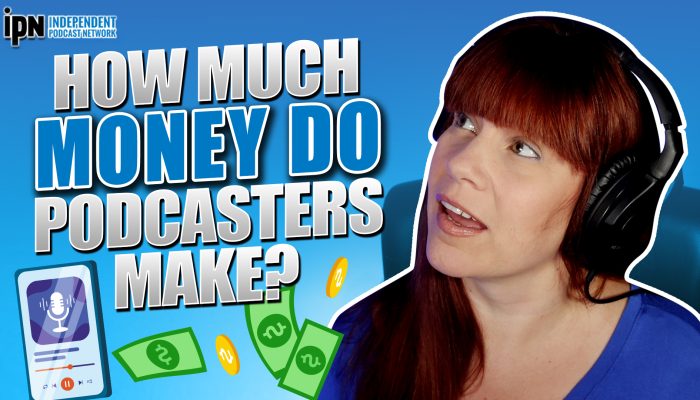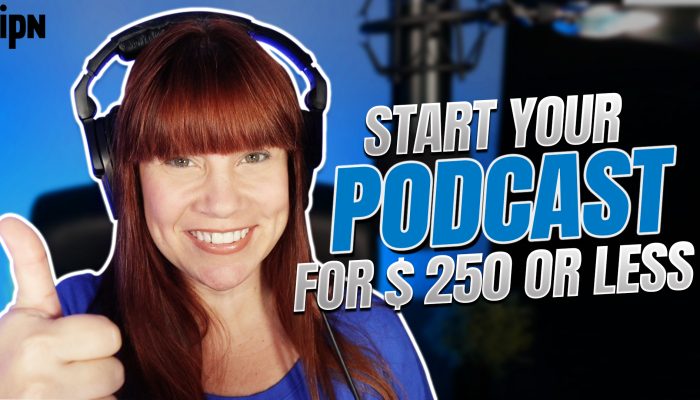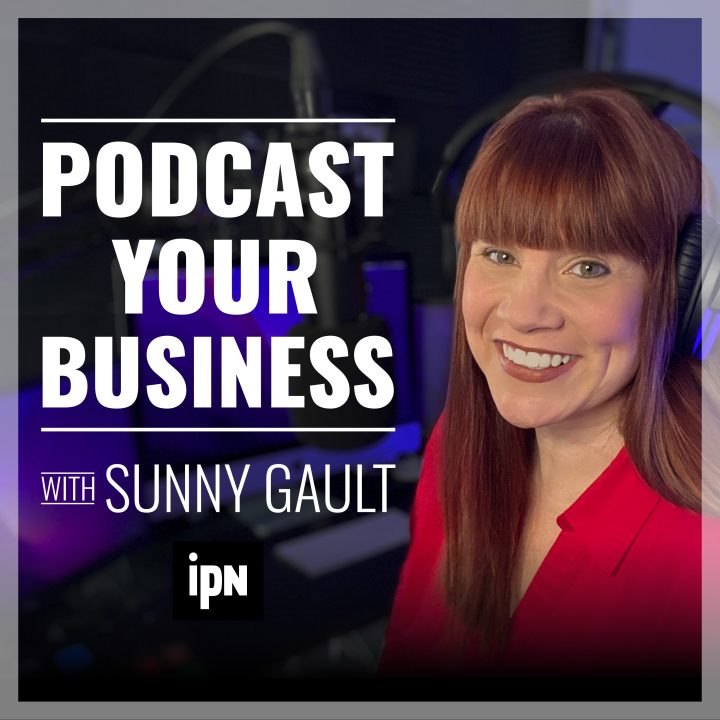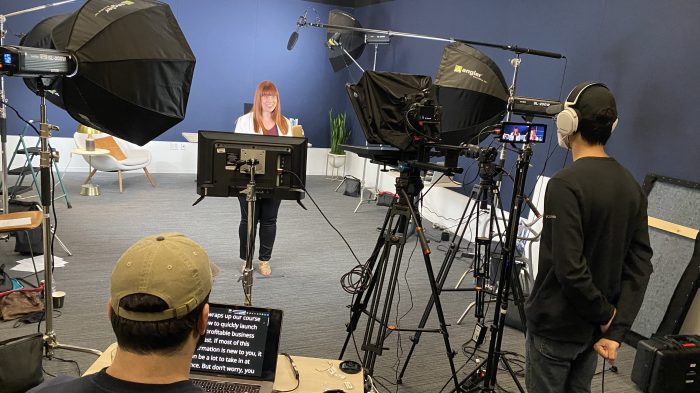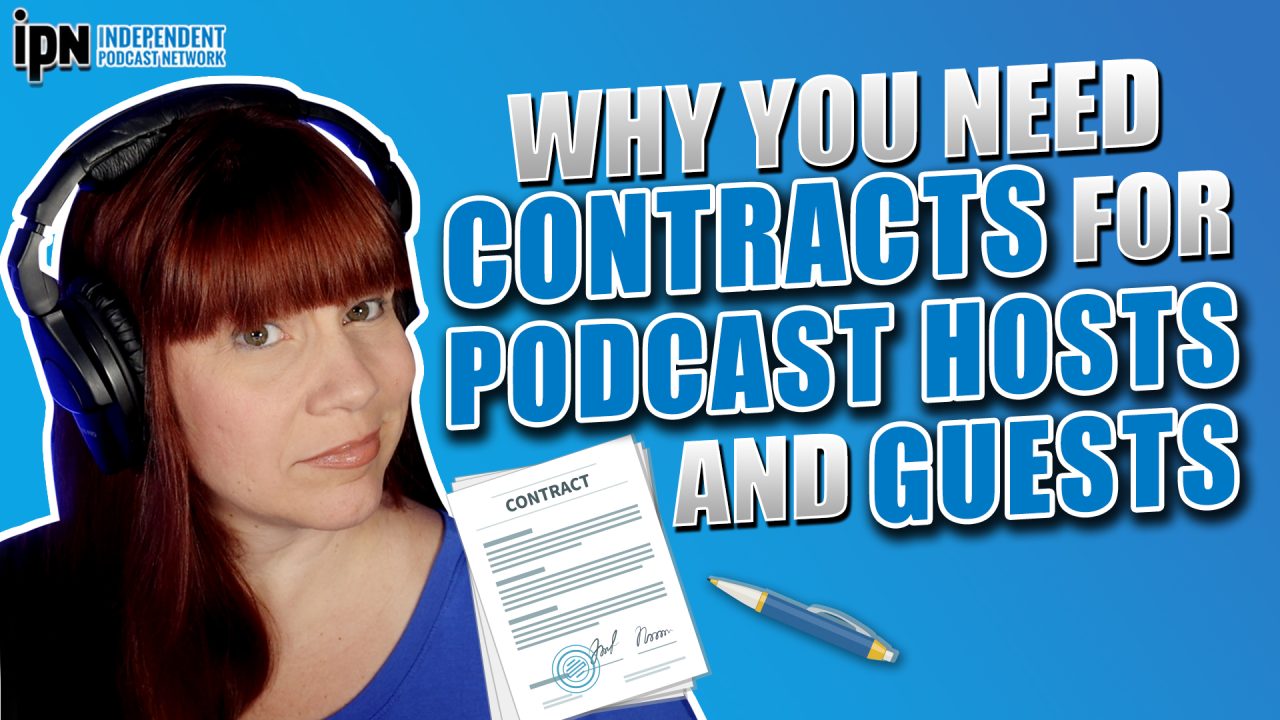
it’s time to practice safe “guests”.
As a podcaster, you work really hard on your show. So, you need to protect it. This means you need to have contracts for anyone working on your show, but especially anyone who appears on the show such as a podcast host and guests. It may seem like a hassle, but you need to make sure you have full permission to use these recordings the best way you see fit. Or you could end up in some hot water, like me. Today we’re talking about creating contracts for podcast hosts and guests.
Here’s what we’re talking about today…
- Why are contracts important in podcasting?
- What should be included in your contract with hosts?
- What are podcast release forms and how are they used?
- Learn more about my mishap with release forms and how it led to legal issues
- How to get a free podcast release form from an experienced entertainment attorney
keep more of your money!
Here are some great ways to avoid podcasting pitfalls causing you to lose time and money.

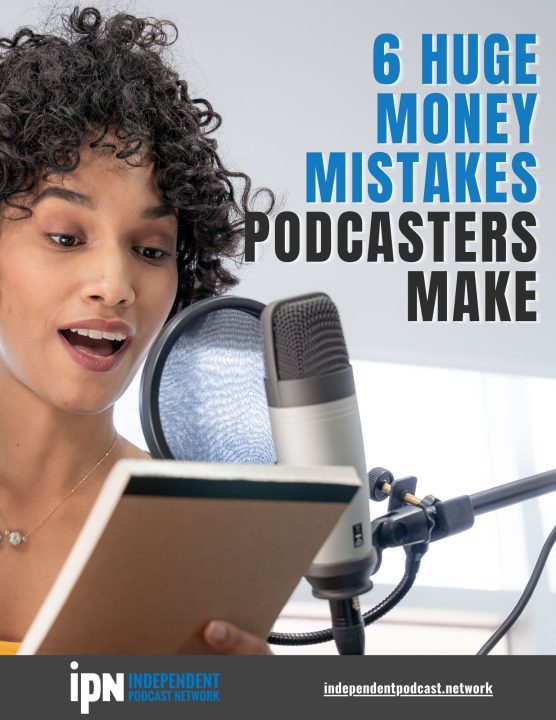
Episode Transcript
0:03
As a podcaster, you work really hard on your show. I know firsthand, so you need to protect it, which means you need to have contracts for anyone working on your show, but especially anyone who appears on the shelf such as a podcast hosts, or our guest. It may seem like a hassle, but you need to make sure you have full permission to use these recordings the best way you see fit, or you could end up in some hot water like me. More on that story later. Today, we’re talking about creating contracts for podcast hosts and guests. Take it away, Mister radio man. Podcast Your Business.
0:50
Hello, everybody. Welcome to Podcast Your Business. My name is Sunny Gault. I am a podcast coach and mentor. And I’ve been doing this whole podcasting thing for the last 17 years. I’m also the founder and CEO of Independent Podcast Network. And you could check us out at https://independentpodcast.network. We love to help all types of podcasters. So we’ve got a ton of free content on our website. And then if you’re ready to work with advertisers, we’d love to help you out with that as well. But today, I am here to help you create amazing podcasts for your business. And we do this by mastering the five P’s of podcasting. Yes, thank you, Mr. radio man, the five P’s of podcasting. This is a concept that I created, and really thinking about what podcasters need to know in order to have a successful show. And I break this down into five P’s, I’ve got some free courses you can take that are on the website that are all about this. But the P stands for prep, plan produce, promote and profit. Prep, should you even start a podcast? What are some of the initial questions you should be asking yourself? And if you’re doing this for your business? How is this going to help your business? Plan? What’s the look and feel for your show? What’s your overall show format? Are you doing this by yourself? Are you having guests on your show? Produce is actually creating the content, right? Whether it’s audio or video. Promote, telling everybody about it and getting people to subscribe to your show. And then profit. How are you going to make money with this? And is this making money for your business? Or is it tied to something else? So those are the five P’s. Mr. radio man? Which of those five p’s are we talking about today? Plan.
2:40
That’s right, we’re talking about planning for your podcast. Because as you are planning, you need to make sure you have the rights to use whatever you’re going to record for your podcast in whatever way you want. Because here’s the thing, you never know what could happen. As podcasting evolves, we are seeing shows cross mediums. So something that starts out as a podcast could suddenly turn into a radio or TV show, or perhaps a book video game seriously, the possibilities are endless. So you need to make sure you have the legal capability for your podcast to adapt. That’s the positive side effect. There’s also negative things that can happen. We won’t dwell on the negative though. Okay. So this means truly owning the rights to everything in your recordings. That’s the goal of having these contracts or these agreements. Now, I feel the nice, it’s we’re doing a legal show to put up this disclaimer, I’ll probably say it a couple times. I am not a lawyer. And I am not here to give you legal advice. I am simply sharing my own personal experience with you, including a pretty big mishap that happened to me, which I’ll get to it a little bit. So you can learn from these mistakes instead of making them all over again. Okay, I’ve done some things that were good. And I’ve done some things that were not so good. And I’m not too proud of. But you get to kind of see some of my dirty laundry today. Sound good. So here’s what we’re gonna talk about today. Some of the big topics here, we’re going to talk about why contracts are so important specifically for podcasting. You know, why do you even need this thing? Aren’t? You know, are we just recording in our garages and stuff? Why do we need contracts? Next, what should be included if you are going to be working with hosts? Now you may be the host of the podcast, but what if you had a co host? Or what if your business is really putting on the podcast, but you have external hosts? So I think we need to cover that just a little bit. What are podcast release forms and how are they used? And I’m going to tell you about my big mishap that I had this was regarding podcast release forms, and how it led to some legal issues for me is I’m going to tell you all about that. And then at the end, I’m gonna give you a free resource on how you can get a podcast release form for yourself, you do have to give your email for this, though it’s not my resource. It’s a friend of mine who I trust wholeheartedly, and you will find out why as you continue to listen to today’s episode. So we will get started right after this quick break.
5:24
So not to get political here. But I’m one of those people who’s not a huge fan of the US legal system. Now it’s possible other legal systems are just as corrupt, but I’m not a big fan, okay. So when someone tells me that I need to create a contract or an agreement for something, internally, I just roll my eyes. It’s one of those things, I’m just being completely real with you guys. I view it as a necessary evil, because I know it’s gonna cost me money. And I also feel like it kind of takes all the fun out of things. Because you’re basically planning for worst case scenarios. And I don’t like to dwell on the negative. However, I will say this, if you value your podcast, my advice is to take some time, and do these contracts these agreements the right way. Or, and I’m not over exaggerating this, you could lose your podcast. And you might even lose more than your podcast, depending on how you have things set up legally. Okay? Just not worth it. Alright, so let’s dive into this today. It’s the whole reason we’re doing this episode is I want to share some experiences that I have had, and just give you, you know, some things to think about as you move forward. So why are podcast contracts important? So we’ve already said you need to own the content, you’re working your butts off, in doing a podcast and a lot of you that listen to this podcast, you’re doing it in conjunction with your business, whatever that is. And you never know what opportunities may come your way. For example, let’s say you are a psychologist, and you have this whole podcast about psychology and how people can help themselves. And you’re super funny and entertaining. And someone wants to convert that into a television show, and make you the next Dr. Phil or whatever. Okay, now, that may be thinking really big, but stranger things have happened. And don’t we all like to think big and think about how, you know, successful our shows can be. So kind of put that in your brain, maybe it’ll actually happen. But you need to be prepared for these kinds of things. So you never know what’s going to happen. And you need to own all the rights, you need to be able to do whatever you need to do with your podcast moving forward, whatever’s in the best interest of your show your business, however, you have things set up, you just need to be able to act. Okay. So you need to have all the rights.
7:57
Sometimes people say, Oh, well, you know, for example, in my situation, I come from broadcast news, we never had to do release forms for broadcast news, that’s actually under a separate legal entity, if you will, or it falls under like a different set of guidelines, okay? Because it’s news. And if something is news, there are different restrictions or different rules for news. But even with like Public Radio, and things like that, so I have heard people say that before, oh, I worked in public radio, and we never did release form. So why would we have to do it for podcasts? Aren’t we all just podcasting in our garage and our closet or whatever, and we just kind of doing this for fun? Well, hopefully you are having fun doing your podcast. But there is a difference with podcasts as opposed to radio, art or TV because this is changing a little bit. But in the past radio and TV has been a one and done. What I mean by that is your content airs. And then there’s really not another plan to re air it. Right. But it’s different in podcasting, because a lot of podcasts are what we call evergreen, meaning the content can be listened to at any time. It’s relevant, right? So the podcast episode stay up there. So you need to have more flexibility with all of this. Okay, so that’s why podcast contracts are important, and why you can’t quite compare it to something that’s on radio or TV or news or something that you’ve done in the past.
9:28
Let’s really quickly I want to talk about contracts with podcast hosts. I know that’s not going to affect everybody listening to this episode. But you may have a situation where you are not the host for the podcast, or maybe you’re not the only host, maybe you have a co host. And again, keeping with this whole theme of owning everything that’s part of your podcast, you need to make sure that they’re under some sort of contract. Now I do this with my parenting shows. Even when I first launched the shows I didn’t, you know, I didn’t host all of them that had been way too much money. So I had other co hosts and, you know, colleagues basically posting the shows, and they always had contracts. Now I like to keep contracts as simple as possible, with as little legalese as possible for the reasons I already mentioned. You know, I don’t want people to get freaked out, when, you know, they’re handed a contract. Now, some of this stuff, there’s some legalese that you got to keep in there. And I get that, but whenever possible, I try to keep things as straightforward as possible. So people don’t feel too intimidated. And I kind of view these contracts as an agreement, just to make sure everybody’s on the same page, you know, I’m going to do this, and then you agree that you’re going to do that. Okay. So obviously, you know, as far as what to include, you’ve got to have the basic stuff, their name, their address, I think having the length for how long the contract is going to be for can be helpful. So that could be an actual physical date. I’ve also set things up, according to the amount of episodes. So right now, we have, I’m actually really excited about this, we have a brand new set of hosts, husband and wife team that are coming on board to host our pregnancy show called preggy pals. And when I have new hosts come on board, I always like to do a 10 episode trial run. And I don’t really know when the dates are going to wrap up, because they’re kind of new to this whole podcasting thing. And I like to give them some flexibility. So instead, I give some loose dates, but I also say it’s to include 10 episodes, right? So the length of what the contract is, you can kind of you know, you can kind of be flexible with that, if you need that for whatever project you’re working on. I also am very specific with the hosting responsibilities, I think that’s really important. So however you incorporate that in your contract, I just kind of go through and I think in my head, okay, what exactly they’re going to have to do in order to host an episode, and you know, handed off to somebody else, or whatever those responsibilities are just go through. And in fact, I think it’s a good idea to kind of create some bullet points in advance, and then turn that into whatever the hosting responsibilities are. Obviously, payment is really important. If you are paying your house, whatever that is, I’ve done everything from you get a fraction or a percentage of the income coming in for that month, I did that in the very beginning, when I had my parenting shows, because I I couldn’t pay them a flat, you know, amount of money, it had to be based on what we’re bringing in. So I’ve done percentages. Now I’m at a point where I can play, pay them a flat rate. So all of that is included in there, as well as how often they get paid, do they have to invoice that kind of stuff? I think having something in a contract about confidentiality is really important. Not that we have super secret, like trade secrets going on here. But you never know. Right? I think everyone should be respectful. I just kind of view this as a respect thing. But the legalese is confidentiality. So I think having something like that in there is important. Also having some sort of terms and outline, okay, if someone isn’t happy with this setup, if someone wants to get out, what is the appropriate way for them to exit the contract? You know, is it 30 days? Is it 60 days? Do they have to submit something in writing, that’s typically what it is. And I do recommend having it in there not necessarily that you’re gonna go after the person if they don’t do that. But again, I don’t just view this as something that I’m going to take to a judge or a jury or something like that, you know, to fight my case, I view this as an agreement to make sure we’re all on the same page. And I just think it’s great to kind of outline it that way. So let them know in advance, how do they get out if they’re unhappy, because you don’t want to work with them if they’re unhappy, right, that doesn’t make for a good working relationship and vice versa. So I like to outline that. So those are the some of the things that I think are really important, you know, to have an a contract with your podcast host. There are other things that should be included, I would probably just do some sort of Google search. There’s different people out there that can obviously help you create these kinds of contracts. If you need something more specific, and there are general ones out there you can probably download and modify yourself. Again, I am not a attorney. I am not a lawyer. So these are just some of the practices and things that I’ve done in the past.
14:45
So let’s talk about podcast release forms because this is going to impact almost everybody out there if you ever have guests on your show. So if you have a show where it’s just you talking and you are owned everything already, then it’s not that big of a deal. In fact, it’s not a big deal at all. It’s just you. But if you are going to interview other people, technically they should be signing a podcast release form. So what in the world is it? This is a short contract. By short, I mean, it’s not super detailed is not gonna be five pages long, right? It’s like usually one page, short and sweet that your guests signed before before before that’s really important, appearing on your podcast. And it can take different forms. I want to break this down for you. Okay, so you have this standard, the physical written contract. When I first started doing my parenting shows, we physically met in a building, everyone had to come to a building, we all had our little microphones set up, you know, I think I’ve told this story several times how we had kind of a round table, I had like five or six microphones set up. And I physically brought paper contracts that people had to sign, good old fashioned, just whip out a pen and sign the contract. Okay, what’s nice about doing contracts that way, is people usually remember physically signing a contract. If it’s electronic, which we’re going to talk about in a second thing may forget, okay, so that’s the benefit. The downside is you got all this paper stuff, you got to file it black, you know, that’s nobody likes paper anymore. But that’s the physically, you know, written contract. Now, let’s talk about digital contracts. So you can have a contract online. And this can either be through something like Google Forms, right, if you guys have used Google Forms, it’s really easy to set up. Or you can have some sort of an electronic signing system, some sort of platform that you already use, like there’s DocuSign, I have used Eversign in the past. And I think it only cost me like 10 or 12 bucks a month, it was a steal, I don’t know if they’re gonna change their price this by the time you hear this episode, but it was a lot cheaper than something like DocuSign. So I’ve used them in the past, if you have some sort of business management system, you’re already using, like I use Dubsado, to be able to manage a lot of different things. They have contracts built in there that people can just sign electronically. So these are some different options that you might be able to use. What I like about this is if needed, you can track the IP address, because at first I was like, oh, even with something like Google Forms. I was like, Okay, anyone can just type their name, like, how is that even helpful, but I talked to a friend of mine, who I’m going to introduce you to a little bit. And he’s like, Oh, no, they can track the IP address. And I was like, Oh, perfect. So that’s why the digital contracts can work. And it’s nice and easy, right? You send them a link to a form, they fill it out, boom, said and done.
18:01
The other option is verbal. Okay, what do I mean by that? Well, they’re coming on your podcast. So after you hit the record button, you could do a verbal contract with them. All right. Some of the things that I’ve done in the past, I don’t recommend that you do this. But I did a very simple one, which was like, you know, say your name, say the date, let us know you’re being recorded and give us permission to use the recording. And the reason I don’t recommend that is because in using just a verbal contract, and something that simple actually got me into some hot water. This was many years ago, I would say, seven or eight years ago. So I’ve told you guys about my parenting shows, right? One of those shows is called The Boob Group. And it’s all about breastfeeding. When I first launched the show, we had a lactation consultant who was hosting the show. And a lot of the guests that happened to be on the show were lactation consultants as well. And one of the lactation consultants, had a very hard stance and didn’t want us to work with any advertisers that she viewed could somehow be harmful to a mother’s breastfeeding relationship with her baby. And that included bottle companies believe it or not, we won’t go down this whole path, but just know there are a lot of lactation consultants that kind of frown upon bottles, because they think that interferes with the breastfeeding relationship. So we had this guest on the show. She did a I think a verbal release, maybe she signed No, she never signed anything because she was never there in studio. So this was all just verbal releases, very simple. And a couple years later, after she’d been on the show, I found an advertiser, and it was a company that I really, really believed in because at the time I was breastfeeding twins, and I really needed some help with the whole breastfeeding thing. And their bottles, this company’s bottles pretty much saved my breastfeeding relationship with my girls. Because my girls were kind of picky on what bottles they used. And if I couldn’t pump, and you know, use bottles, then the whole breastfeeding thing was pretty much kaput. So I love this one company, it was a larger company of more well known company. So I was really excited to land an advertising deal with them, they had more money, but not only that, I just believed in the product. And those are the kinds of advertisers you really should have on your show. And so I was able to negotiate a deal. And this lactation consultant found out that I was having this company sponsor some episodes. Again, she hadn’t been on the show in the years. But she wanted me she contacted me and asked me to remove her episodes. Now, I said, No, I did not want to remove her episodes, because I knew how much work went into making those episodes happen, not just on my, my side of things, okay. But again, this show had a separate host. So the host was involved. All of these episodes had different breastfeeding moms that showed up for the recording, and volunteered their time, you know. So this was important. And I also knew that there were a lot of people that were still listening to these episodes and benefiting from them, and maybe even saving their breastfeeding relationships with their children. So why would I take this down? Based on her personal issues with an advertiser? So I said, No, I wasn’t going to take it down. And so she proceeded to get a lawyer involved, and send me I don’t even know what it’s called, but basically says, We’re gonna sue you, or We’re suing you. that got my attention. I’m not gonna lie. I’ve never received one of those before. This was not just a cease and desist. This was a, you know, We’re suing you.
22:08
It was at that point that I went back into my recordings to see, what did I actually have her agree to contract wise, or, you know, guest release form wise, what did she say, and it was only the verbal agreement. And honestly, after doing some digging, and talking to some attorneys, I found out that really wasn’t enough, I really needed something that outlined that I had full rights to this in perpetuity, or whatever that word is perpetuity, you know, in all lands, and all universes all this crazy stuff, right? I just made it way too simple. And I didn’t have much of a leg to stand on, legally. Set aside the fact that, you know, she wanted to sue me for 1000s of dollars that I didn’t have. And I also just wanted the whole thing to go away. You know, I’m a mom with four little kids, I’m just trying to help parents out there. And here is this crazy woman trying to sue me. So I wanted the whole thing to go away. And so long story short, I ended up taking down her episodes, but I was really nervous about doing that, because she was so influential. I had other lactation consultants who had been on the show reach out and say, oh, so and so you know, got her episodes taken down, I want mine taken down. And I could just see this thing spiraling out of control, right. But thankfully, you know, I think I probably ended up taking down 15 to 20 episodes out of, you know, 150 or so episodes we had at the time. So, you know, it could have been much worse. But out of that whole experience that really taught me like you have to be careful with this stuff. Do you really want to go toe to toe with these people, because all of this costs money. But if I had just taken the time, had the right, you know, release form, which I’m going to advocate for a written release form that you just send out, right, that they can just sign electronically. That is the easiest way to do this.
24:13
So let’s quickly talk about what needs to be included in a guest release form. You need consent to do the recording, as well as the reproduction of the guests voice that’s important. You need to make sure that you are the sole owner of this. So maybe it’s under your business name, right. But you have complete authority over everything that is recorded, you own the rights to everything. You have the ability to use and distribute the programs or you know, your episodes and all media formats throughout the world. Write that whole thing that you can use any materials they submit to you. So if they send a photo and a bio that you’re putting on your website, you need to be able to use that you need to make sure that they I understand that you’re not compensating them as a guest unless you are. But most guests aren’t compensated need to be able to use their name and likeness if you’re doing any promos or things like that. And ultimately, the guest should release you from any kind of liability associated with the podcast, their appearance and all that good stuff. So I’m sure most of you were not taking notes on that. And that is okay, because we have a free podcast release form for you. Now, when I was going through my whole crazy lactation consultants, so they may experience I reached out to do a bunch a bunch of research to figure out does she have a leg to stand on Do I feel like to stand on, and one of the people I consulted with his name is Gordon Firemark. He is an entertainment attorney based in Los Angeles. But he’s also a podcaster. So he knows a lot about how to deal with podcasts and how to deal with guests and contracts, agreements, all of that good stuff. I have talked to Gordon many times since he’s become a friend of mine. And it’s actually his release form that he offers for free. So here’s the link, guys want you to go to it, download it, and I want you to start using it. Okay, here’s the website, https://www.gordonfiremark.com/PodcastRelease. And I’m sure if any updates need to be made, he’ll make updates. You know, it’s all Gordon’s thing. This is his wheelhouse. I want you to take that template, I want you to convert it into a Google form. And then you send it to your guests in advance, all they got to do is like type out their name, type out the date and click a box and say yes, I agree to this. Said and done super easy, right. And if you do need more help with those hosting contracts and stuff, I briefly went over about what I like to have, if I’m dealing with, you know, a co host or another host that is hosting a show for me, Gordon can help you out with that, too. He’s done many contracts for me over the past. And he’s not paying me to say this. Okay, he’s just a really good resource. And I know, this is one of those things that can frustrate a lot of podcasters. So I want to give you the resources, so you don’t fall into the same situation I fell into, and that you handled this correctly, and you feel confident about it. Nobody wants to worry about this crap, right. Okay, so I do have some free stuff for you as well. More on that after this quick break.
27:24
So you got your free podcast release form from Gordon Firemark, that’s awesome. But I have a free handout for you as well. So we’ve been talking about mistakes, right? That you make, like one mistake might be not having the right release form. Well, I have a handout it is called “6 Huge Money Mistakes Podcasters Make. So if you’re really serious about making money with your podcast, or want to download this, I believe and ask for your email address. Like that’s not like a big thing with me. But I’m gonna put the link in the description below. So that will take you to our website at https://independentpodcast.network. And you can grab the document from there. And while you’re there, guys, we have a ton of free resources. We’ve got blog posts that are being released every week, more great podcast episodes like the one you’re listening to now, videos, lots of handouts. And if you’re brand new to podcasting, we even have a free how to podcast course where I go over the five P’s of podcasting that we talked about earlier. Okay, so lots of great stuff. Please check us out. And I hope you enjoyed today’s episode. Until next week, remember, you should start a podcast!
